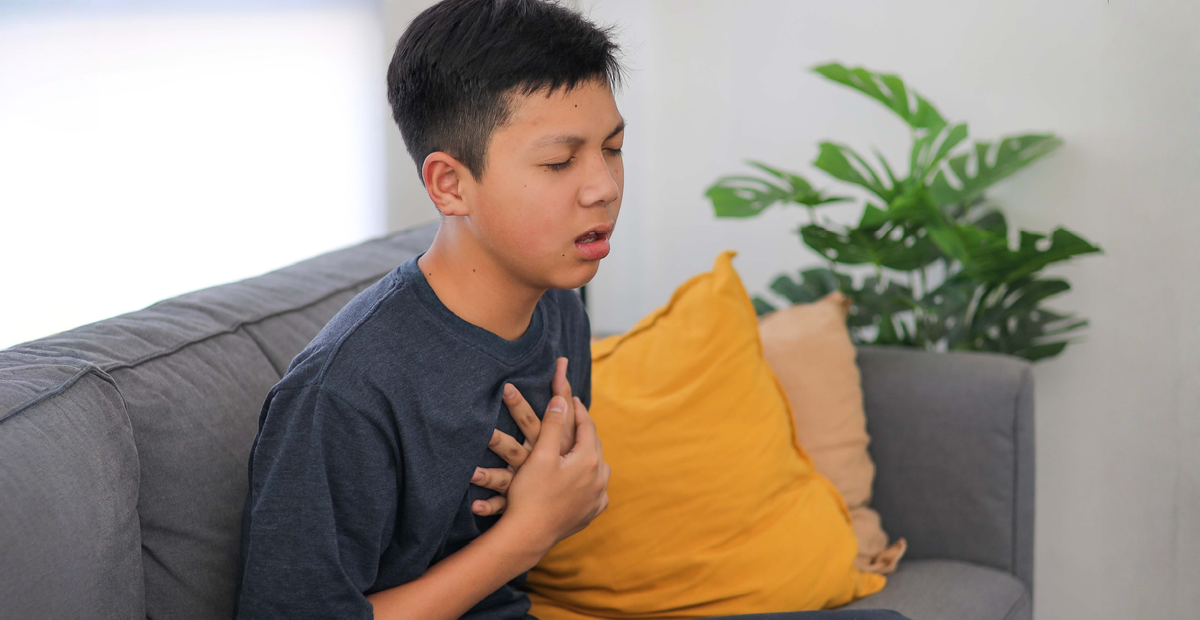Table of Contents
Just because a teen isn’t visibly sad or speaking up about feeling depressed, doesn’t mean they aren’t experiencing symptoms or showing warning signs.
“I think the first time that I was conscious of going through depression was in 12th grade. Because of the lack of information, I didn’t know that it was depression before that. But now, as an adult, I can look back and think, yeah, I was definitely depressed. The first sign was just a lack of interest in the things that I normally and generally loved and enjoyed. I felt lost.”—Aidan, 19.
Unresolved depression in teens can lead to a lack of purpose, isolation, withdrawal from activities or passions once enjoyed, and increase the risks of serious health challenges such as substance abuse, self-harm, or suicide.
Fortunately, more treatment options than ever are available, and teens don’t have to suffer in silence.
Understanding Teenage Depression: Common Signs
Teen depression is sneaky. It can appear as typical teenage behavioral traits such as mood swings, or it may be headaches, stomach irritability or other physical health problems. You may also notice impaired functioning—a slip in grades, a decline in personal hygiene, or sudden angry or aggressive outbursts.
Physical Signs of Teen Depression:
- Changes in Sleep or Appetite: Depression disrupts neurotransmitters and hormones such as serotonin and melatonin. This causes symptoms such as inability to fall or stay asleep (insomnia) or oversleeping (hypersomnia), lack of appetite, or binge eating.
- Gastrointestinal Problems: Emotional distress and depression can impair the functioning of the gut, leading to unexplained symptoms such as stomach cramping, nausea, vomiting, constipation or diarrhea, and bloating [1].
- Headaches, Migraines, and Muscle Tension: Disruption of neurotransmitters such as serotonin and norepinephrine can impair pain perception, increasing sensitivity to muscle tension or everyday “aches and pains”. Sleep disruption caused by depression has also been linked to increased headaches and migraines [2].
- Catatonia: In rare cases of depression, teens can suffer from catatonia, a severe psychiatric syndrome that makes patients feel withdrawn from the world and unresponsive to external stimuli. It is characterized by an inability to speak or express oneself, rigid posture, and lack of flexibility or movement.
Psychological and Behavioral Signs of Teen Depression:
- Isolation and social withdrawal: Teens with depression often withdraw from typical activities or connecting with friends and family due to mental exhaustion, fatigue, low self-esteem, feelings of shame, or guilt.
- Restlessness, irritability, or aggression: Hormone fluctuations, mood instability, and increased cortisol (stress hormone) levels, all of which are common factors in teens with depression, can make teens feel on edge, powerless, or like they lack control [3].
- Lack of self-care: Teens may struggle to participate in basic self-care tasks or personal hygiene, such as showering or brushing their teeth. Shame or feelings of unworthiness can lead them to disregard their hygiene. And symptoms such as fatigue or mental exhaustion can make it physically challenging to complete tasks.
- Self-harm or suicidal ideation: In severe cases, teens may struggle with self-harm such as cutting or burning themselves, participating in dangerous behavior without regard for their own life or the lives of others, thoughts of suicide, death, or feeling the need to escape.
Importance of Early Intervention
The earlier teens are diagnosed and treated for depression, the better. Several studies have shown how early intervention and mental health prevention programs, such as the Blues Program or Say Something Program, can reduce the onset of depression for at-risk adolescents.
These promote mental health education and literacy so teens better understand their internal worlds, build skills for emotional processing, and learn how to seek support for mental health crises. Teens who participate in early intervention often have increased motivation, better communication, and self-acceptance [4].
Types of Therapy Available for Depressed Teens
Several mental health therapies exist with well-documented evidence to improve symptoms of teens with depression.
Cognitive Behavioral Therapy (CBT)
CBT is one of the most widely used therapies and a first-line treatment for depression in teens. It has been shown to reduce symptoms of depression in as little as 8 to 20 sessions. It follows the theory that our thoughts influence our mood and emotional states, which in turn influence our behaviors.
A few ways CBT treats depression in teens are:
- Cognitive Reframing helps teens find and use evidence to restructure negative thought patterns and challenge cognitive distortions such as black or white thinking (e.g., “If I am bad at one thing, I must be a failure in life).
- Behavioral Activation encourages teens to engage in positive, healthy activities that bring them joy. This can give them a sense of accomplishment and improve their self-esteem. Therapists may encourage teens to participate in one small activity they enjoy each day (e.g., going on a walk, texting a friend, or playing with a pet).
- Self-awareness is built in CBT, emphasizing the importance of reflection around one’s thoughts and moods. Teens might be encouraged to keep a mood tracker on their phone or a daily journal.
- Skill-building is taught throughout CBT to help teens regulate their emotions, manage stress, resolve conflict, foster independence, and overcome everyday challenges.
- Setting Achievable Goals is a key part of CBT that can help teens develop a sense of purpose and hopeful outlook of their future. Goals can be related to treatment (e.g. I will track my mood for 2 weeks straight) or unrelated to treatment (e.g., I will sign up for a new club).
Family Therapy
Family therapy is an important component for teens, who require a solid support system for successful recovery. Family therapy can improve symptoms of teen depression by helping teens feel like they aren’t alone in their battle and can overcome feelings of isolation. Family therapists focus on building skills such as communication, active listening, problem-solving, decision-making, and boundaries.
These can improve family dynamics and address challenges in the home that are contributing to depression or other mental health problems in teens. Research has found that although family therapy alone may not be an effective treatment for depression, when paired with conventional forms of treatment such as CBT or medication, it can make treatment outcomes more successful [5].
Group Therapy and Peer Support
Group therapy and peer support programs provide a powerful space for teens to foster connection, build confidence, and feel seen. It teaches teens that they are not alone in their struggles, decreasing feelings of isolation. Under the guidance of a licensed therapist, group sessions are a nonjudgmental space for teens to process heavy emotions and develop healthier perspectives.
Studies have shown that group therapy, particularly in activity-based programs (such as adventure therapy), shows high participation rates and reduced symptoms even in teens with severe depression [6].
Trauma and Experiential Therapies
- Trauma-informed therapies such as Eye Movement Desensitization and Reprocessing (EMDR) help teens process traumatic memories and emotional distress that contribute to depression.
- Experiential therapies help teens implement coping skills in real-world scenarios, improve self-esteem, and express themselves in non-verbal ways. These might include dance and movement, nature or adventure therapy, creative arts, and music therapy.
How To Choose The Right Therapy for Your Teen
Choosing the right therapy for your teen can feel overwhelming, especially when you don’t know what to look for. In general, it’s important to make sure that the center or program is accredited, the therapist is licensed and specializes in treating teen depression, and that your insurance is accepted.
A few tips for choosing the right therapy modality for your teen include:
- CBT: Ideal first line of treatment to address a majority of mental health problems in teens. Successful for most mild to moderate cases of depression.
- Group Therapy: Helpful for teens who lack a support system or struggle with isolation.
- Family therapy: Helpful for addressing family dynamics or stressors in the home that contribute to depression.
- Trauma Therapy: Address underlying trauma that contributes to depression.
- Experiential Therapies: Effective when combined with conventional therapy to improve treatment outcomes.
Helping Teens Find Purpose and Recover From Depression in Texas
Clearfork Academy is a network of behavioral health facilities in Texas committed to helping lift teens out of depression and provide them with the coping skills to support their mental health. We understand the effects that unresolved mental health challenges can have on the lives of youth, their families, and communities. Depression is treatable, and teens don’t have to suffer.
We offer evidence-based treatments such as CBT, DBT, and family therapy integrated with Christian faith-based approaches to help teens build emotional resilience and overcome feelings of depression. Contact our admissions team today to see how we can support your family.
Sources
[1] Olynyk, J. et al. (2020). The relationship between abdominal pain and emotional wellbeing in children and adolescents in the Raine Study. Scientific reports, 10(1), 1646.
[2] Trivedi M. H. (2004). The link between depression and physical symptoms. Primary care companion to the Journal of clinical psychiatry, 6(Suppl 1), 12–16.
[3] Mondelli, V. et al. (2022). Cortisol and development of depression in adolescence and young adulthood – a systematic review and meta-analysis. Psychoneuroendocrinology, 136, 105625.
[4] Svoboda, E. 2024. Intervention at an Early Age May Hold Off the Onset of Depression. Scientific American.
[5] Aalberg, M. et al. (2023). Family therapy for adolescents with depression and suicidal ideation: A systematic review and meta-analysis. Clinical child psychology and psychiatry, 28(2), 831–849.
[6] Hearn, B. et al. 2025. Feasibility and effectiveness of a group therapy combining physical activity, surf therapy, and cognitive behavioral therapy to treat adolescents with depressive disorders. Frontiers in Psychology. Volume 16.
Austin Davis, LPC-S
Founder & CEO
Originally from the Saginaw, Eagle Mountain area, Austin Davis earned a Bachelor of Science in Pastoral Ministry from Lee University in Cleveland, TN and a Master of Arts in Counseling from The Church of God Theological Seminary. He then went on to become a Licensed Professional Counselor-Supervisor in the State of Texas. Austin’s professional history includes both local church ministry and clinical counseling. At a young age, he began serving youth at the local church in various capacities which led to clinical training and education. Austin gained a vast knowledge of mental health disorders while working in state and public mental health hospitals. This is where he was exposed to almost every type of diagnosis and carries this experience into the daily treatment.
Austin’s longtime passion is Clearfork Academy, a christ-centered residential facility focused on mental health and substance abuse. He finds joy and fulfillment working with “difficult” clients that challenge his heart and clinical skill set. It is his hope and desire that each resident that passes through Clearfork Academy will be one step closer to their created design. Austin’s greatest pleasures in life are being a husband to his wife, and a father to his growing children. He serves at his local church by playing guitar, speaking and helping with tech arts. Austin also enjoys being physically active, reading, woodworking, and music.




